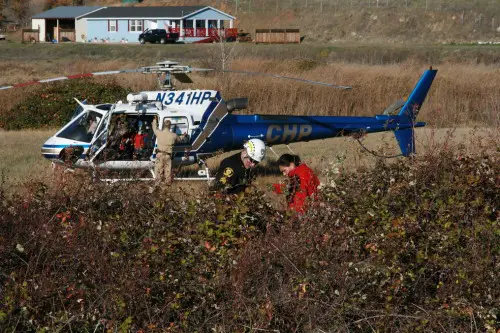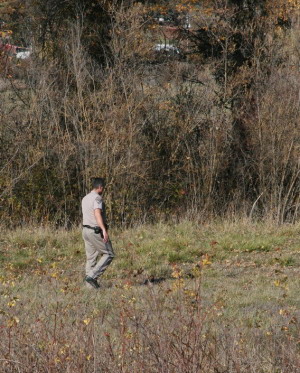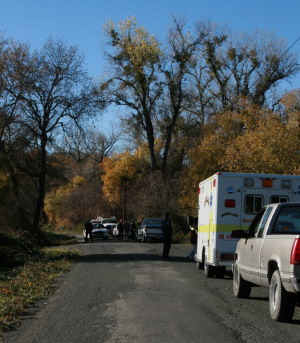LAKE COUNTY – For another year, the amount of illegal marijuana seized and eradicated on public and private lands around the state has grown, with record-breaking seizures reported around California.
For the third straight year Lake County is ranked No. 1 for the area with the most plants eradicated.
The California Department of Justice Bureau of Narcotic Enforcement (BNE) and other participants in the Campaign Against Marijuana Planting (CAMP), including the Drug Enforcement Administration (DEA) Field Division Offices in San Francisco, Los Angeles and San Diego, in conjunction with the United States Attorney’s Office in the Eastern District of California, reported on the seizures.
The marijuana eradication season begins in July and continues through October, officials reported.
The 2008 CAMP season and Operation Green Acres 2 netted a record-breaking combined total of 5,249,881, according to the report.
CAMP alone reported a second year of record breaking numbers of marijuana plants eradicated during the 2008 season at 2.9 million. Of the 2.9 million plants, two million were seized from public lands while the remainder was seized from private lands.
This year's seizures included 3,641,328 plants – or almost 70 percent – that were eradicated from state and federal public land, according to the Department of Justice. That's down slightly from the 75 percent found on public lands last year.
“California is Ground-Zero for domestically produced marijuana in the United States; more than half of the domestically produced marijuana in the United States is grown in California,” said BNE Chief John Gaines.
Lake was the county with the highest number of eradicated plants, 499,508, according to the report. While leading the state, that number was down slightly from last year, when 507,000 plants were seized, but up from 2006, when officials eradicated 344,241 plants, as Lake County News has reported.
The other counties in the top five for illegal eradications this year were the same as last year, only in slightly different order, with Tulare and Humboldt County changing places. Tulare more than doubled its numbers and Humboldt's were halved.
This year, Tulare ranked at No. 2 with 395,489 plants (up from No. 5 and 160,591 plants in 2007); Shasta, 394,375 (No. 3 with 270,728 plants in 2007); Mendocino, 231,802 (No. 4 and 220,436 plants in 2007); and Humboldt, 145,762 (No. 2 with 271,056 plants in 2007). All counties listed, except for Humboldt, had an increase in the number of marijuana plants eradicated.
During the 2008 season, 143 individuals were arrested and 142 weapons seized, the Department of Justice reported. Those statistics are nearly triple the amount of individuals arrested and weapons seizures from 2007, which numbered 53 and 41 respectively.
CAMP and its partner agencies are part of an organized, collaborative effort which is yielding the seizures.
CAMP has been operating for 26 years as a multi-agency task force comprised of local, state, and federal agencies including, Drug Enforcement Administration, Bureau of Land Management, U.S. Forest Service, National Parks Service, California Department of Fish and Game, Office of National Drug Control Policy-National Marijuana Initiative, California National Guard and Office of Emergency Services. The program is designed to help counties eradicate illegal marijuana cultivation and trafficking in California.
“Our forests and public lands cannot and will not be allowed to become safe havens for Mexican drug cartels operating massive marijuana cultivations. These criminal enterprises pose great risk to those simply seeking to enjoy these lands in the manner for which they were intended,” U.S. Attorney McGregor Scott said.
In addition to the 2008 CAMP season, DEA conducted their second year of Operation Green Acres, a four-week, statewide operation that began in late July and was concluded in August 2008. The operation was conducted by federal, state, and local law enforcement agencies, and primarily focused on marijuana grown outdoors.
As a result of Operation Green Acres 2, agents seized almost 1.4 million marijuana plants, with an estimated street value of $4.2 billion, according to the report.
Approximately 1.2 million of those plants were eradicated from public lands in California, a 73-percent increase from last year.
Additionally, 63 individuals were arrested statewide in connection with the operation, the report noted. Of those arrests, seven were charged in federal court in the Eastern District of California, while four were charged in federal court in the Central District of California. Nearly $200,000 in assets and 102 weapons were seized during the operation.
“Each year more marijuana is seized from California’s public lands. It destroys our national forests and threatens the safety of the residents and visitors who seek to enjoy California’s natural treasures. Only with collaborative law enforcement efforts, will we be able to make an impact against this serious problem,” stated DEA Special Agent in Charge Javier F. Peña.
Another important eradication effort, also undertaken last summer, was operation LOCUST, targeting large-scale marijuana cultivation in and around Sequoia National Park. This operation was spearheaded by Tulare County Sheriff Bill Wittman, BNE, along with DEA, U.S. Forest Service and the Bureau of Land Management. It resulted in the seizure of approximately 524,000 plants and indictments of 15 individuals in the Fresno Court of the Eastern District of California.
The CAMP program and its partner agencies continue to eradicate the large scale marijuana cultivations from public and private lands that cause deforestation, damage to wildlife habitats, and hazardous-chemical pollution.
Pesticides, chemical repellants, poisons, and fuels are often used in large-scale, outdoor marijuana cultivation. Attempts to irrigate the marijuana crops often harm nearby ecology including creeks, streams, and rivers. These plants are often under surveillance by their caretakers, who, in many instances, are heavily armed with pre-planned escape routes.
“Illegal marijuana cultivation is wreaking havoc on our public lands and causing extensive environmental damage of these precious resources,” said DEA Los Angeles Special Agent in Charge Timothy J. Landrum. “DEA is committed to working jointly with our federal, state, and local partners in combating this growing threat to our parks and our communities.”
The continued success of the CAMP program is due in large part to the coordinated effort between local, state and federal agencies.
Gaines said the BNE vows to continue its “exceptional partnership” with local, state and federal counterparts to eradicate illegally grown marijuana and prosecute those individuals and organizations responsible for trafficking this drug while damaging the environment and endangering the lives of citizens.
E-mail Elizabeth Larson at elarson@lakeconews.com.
{mos_sb_discuss:2}
















